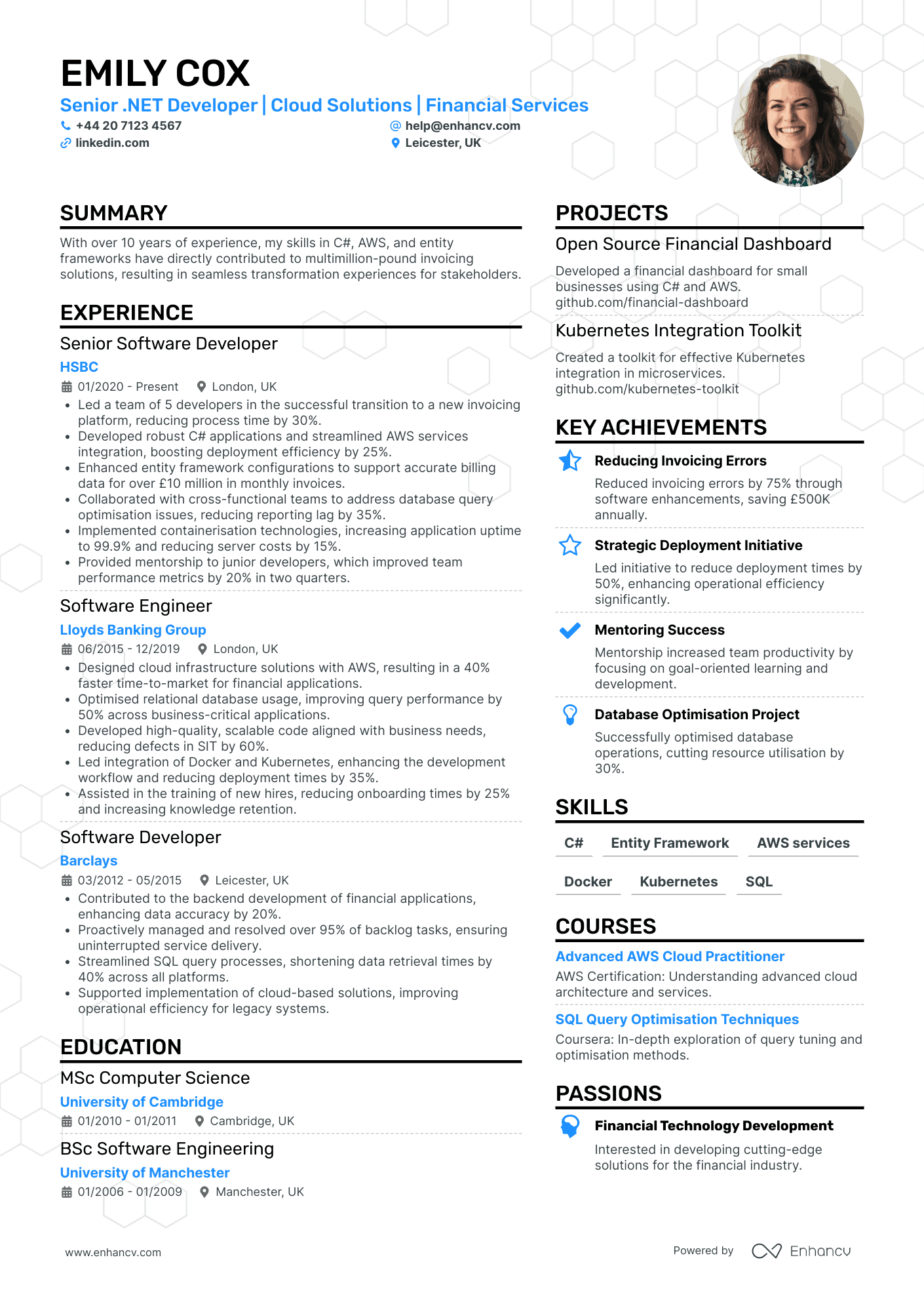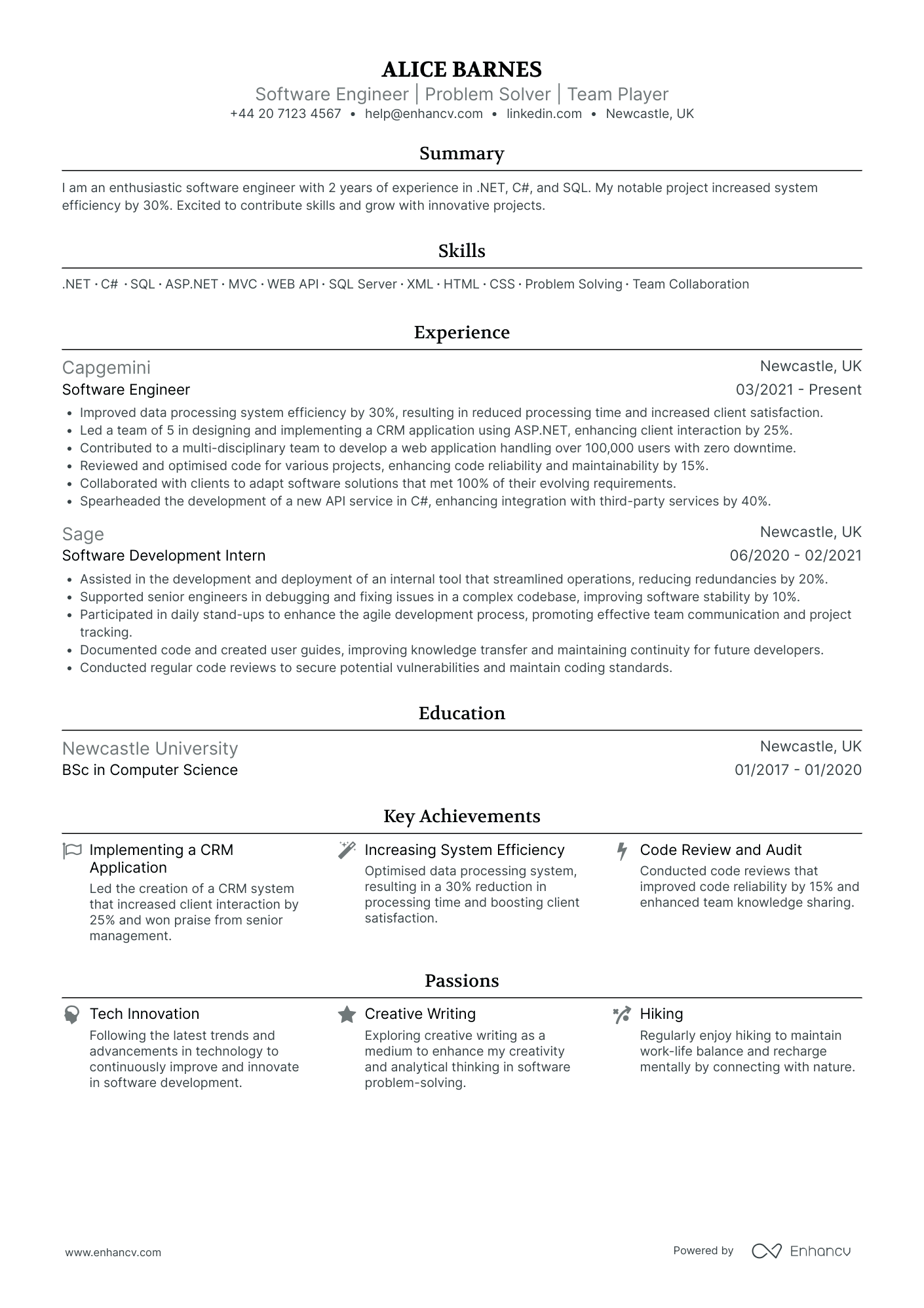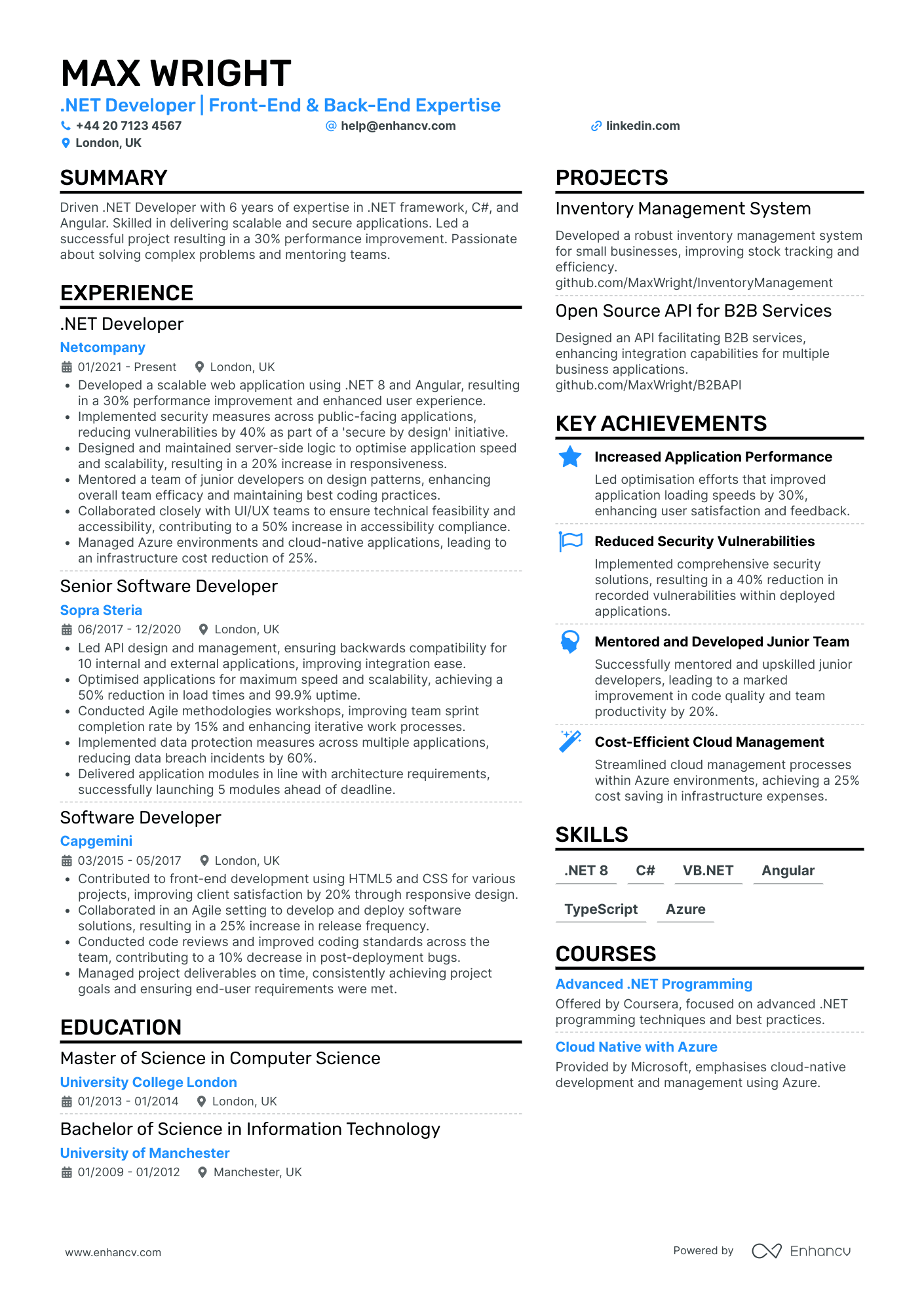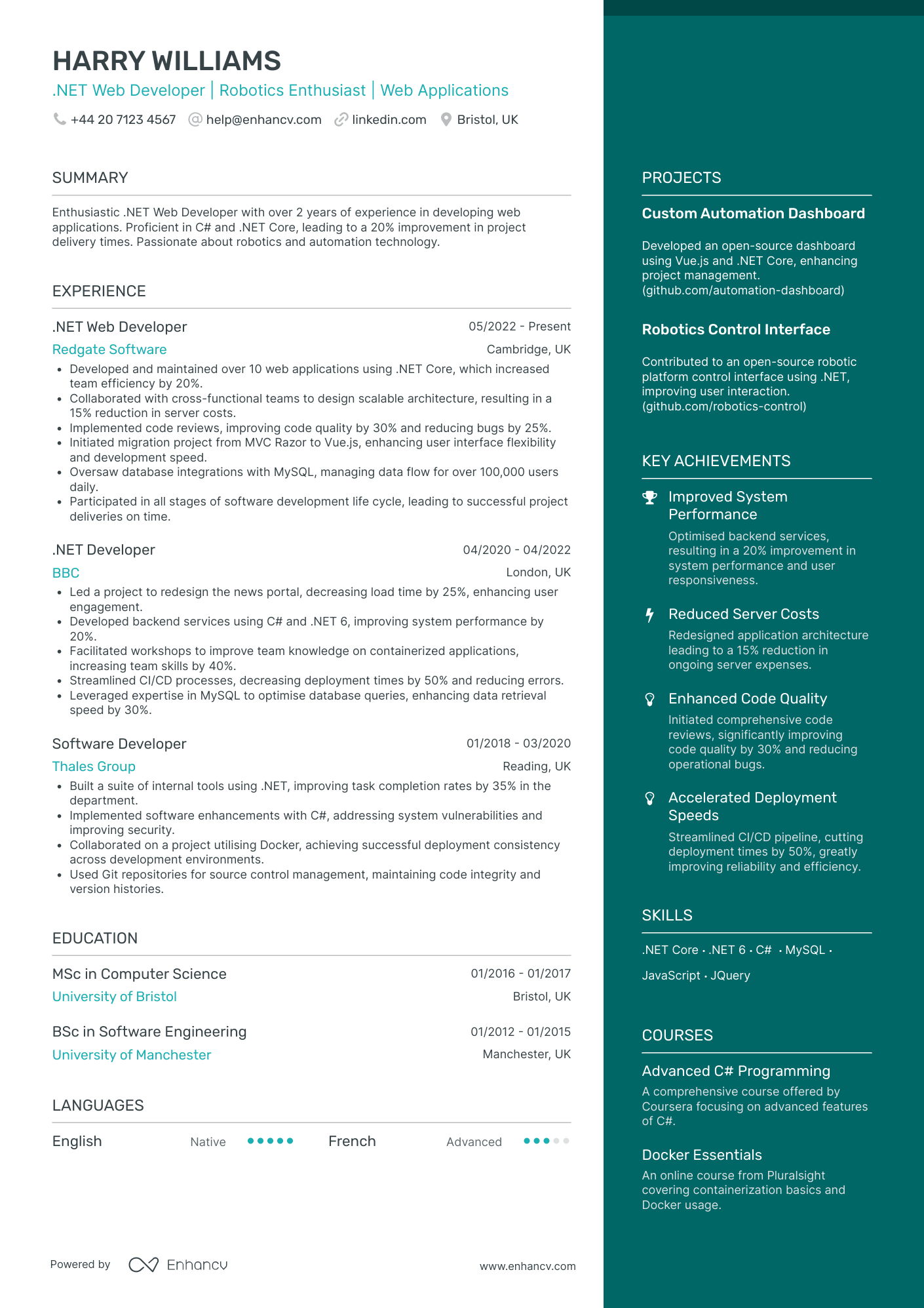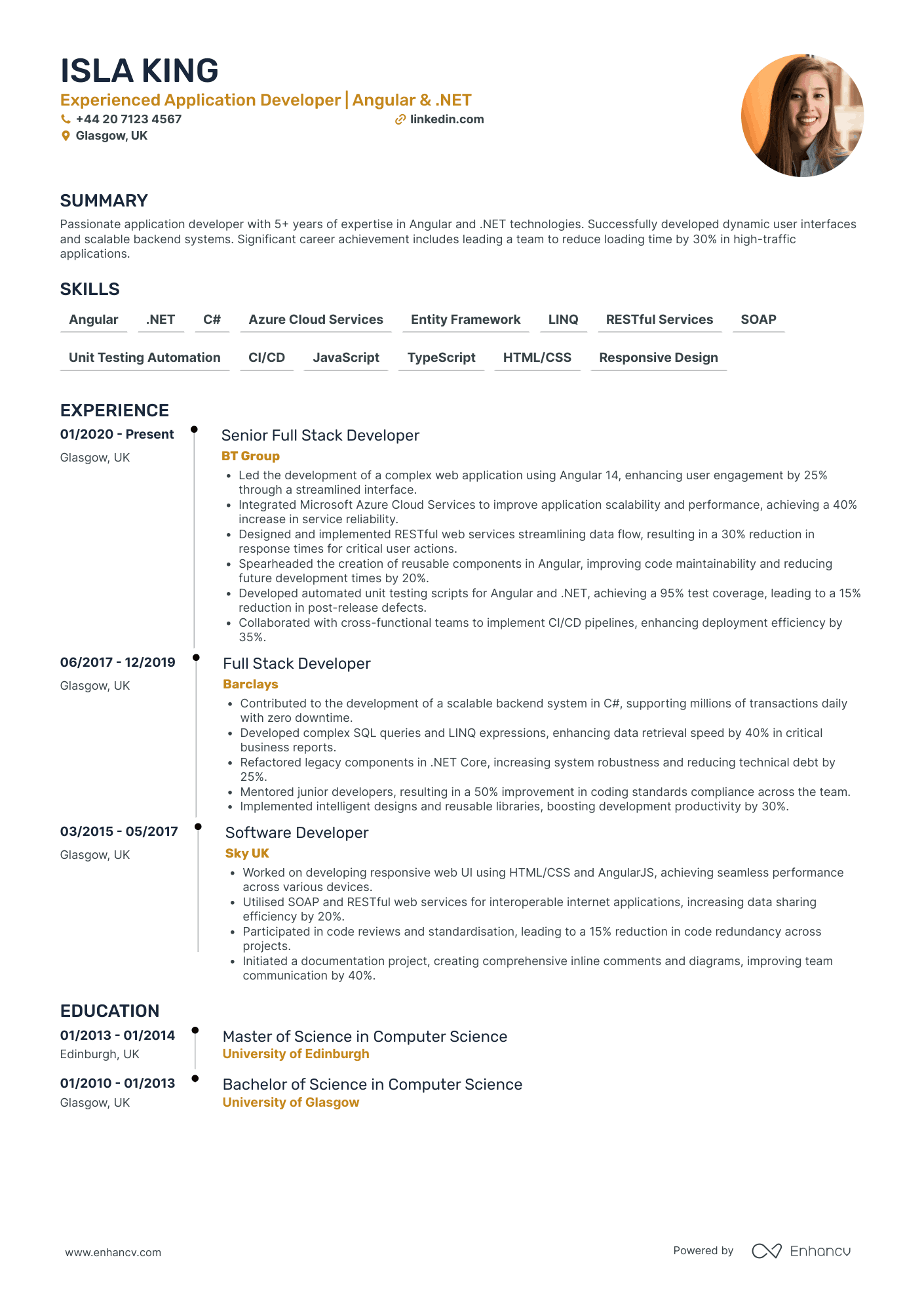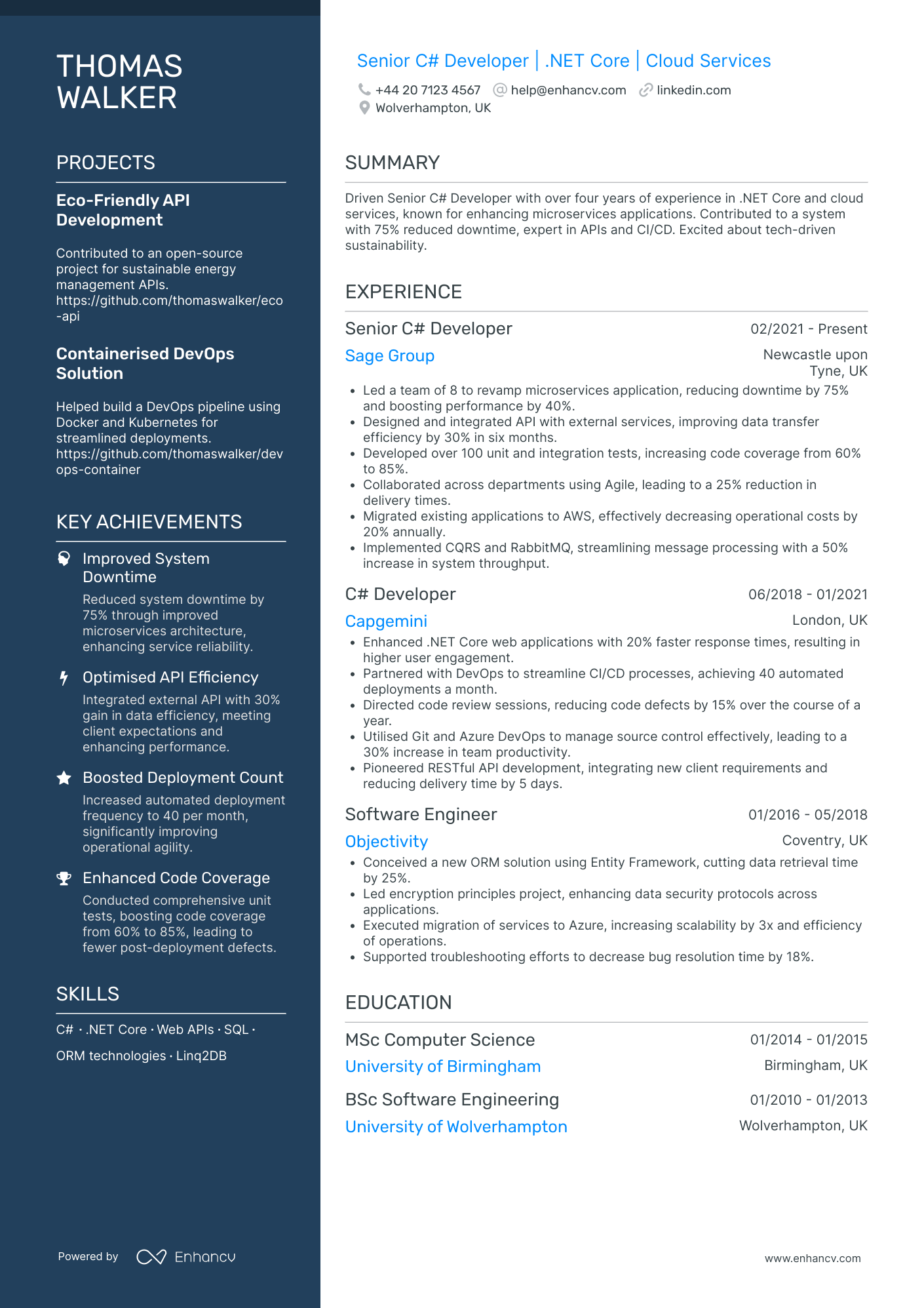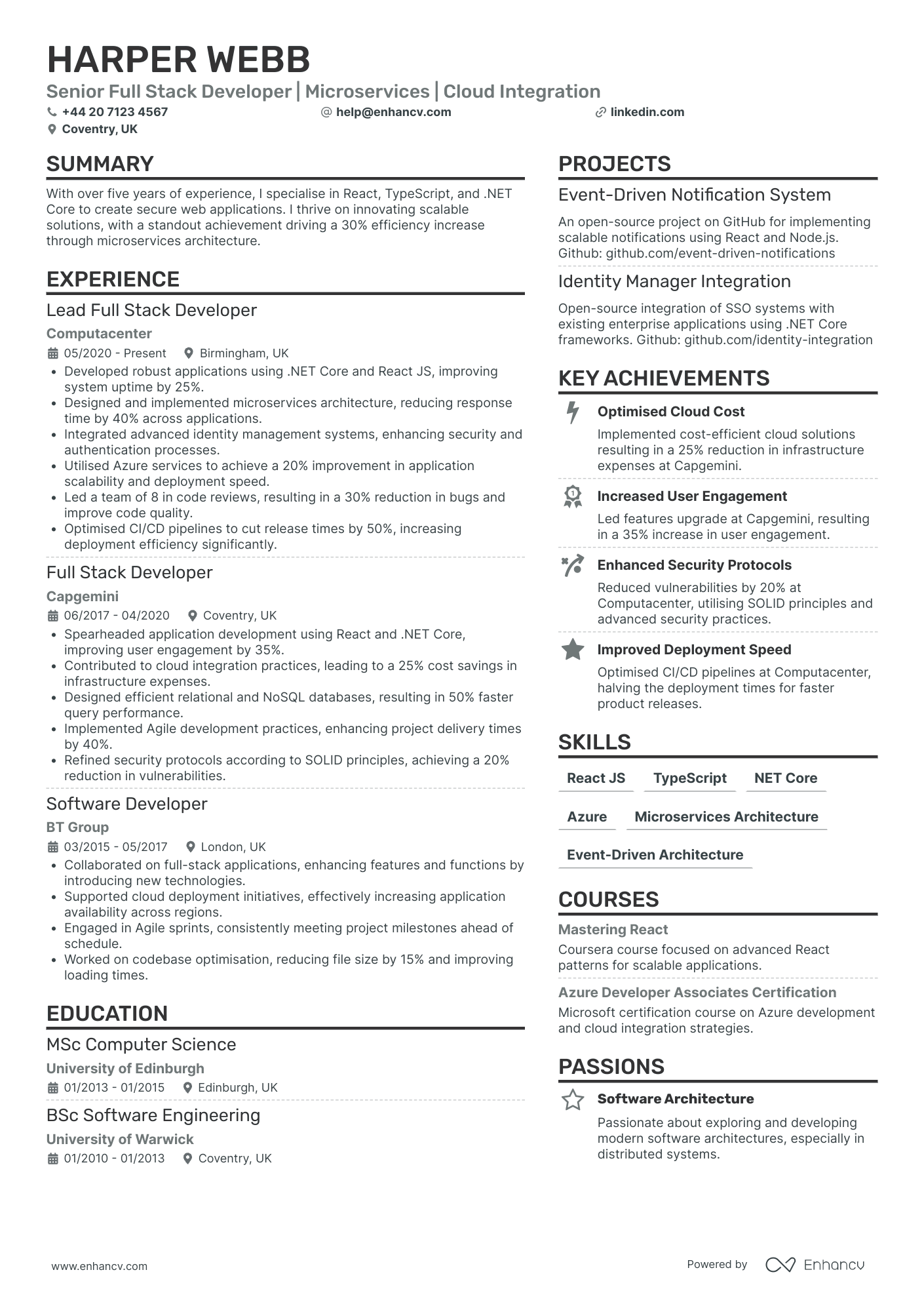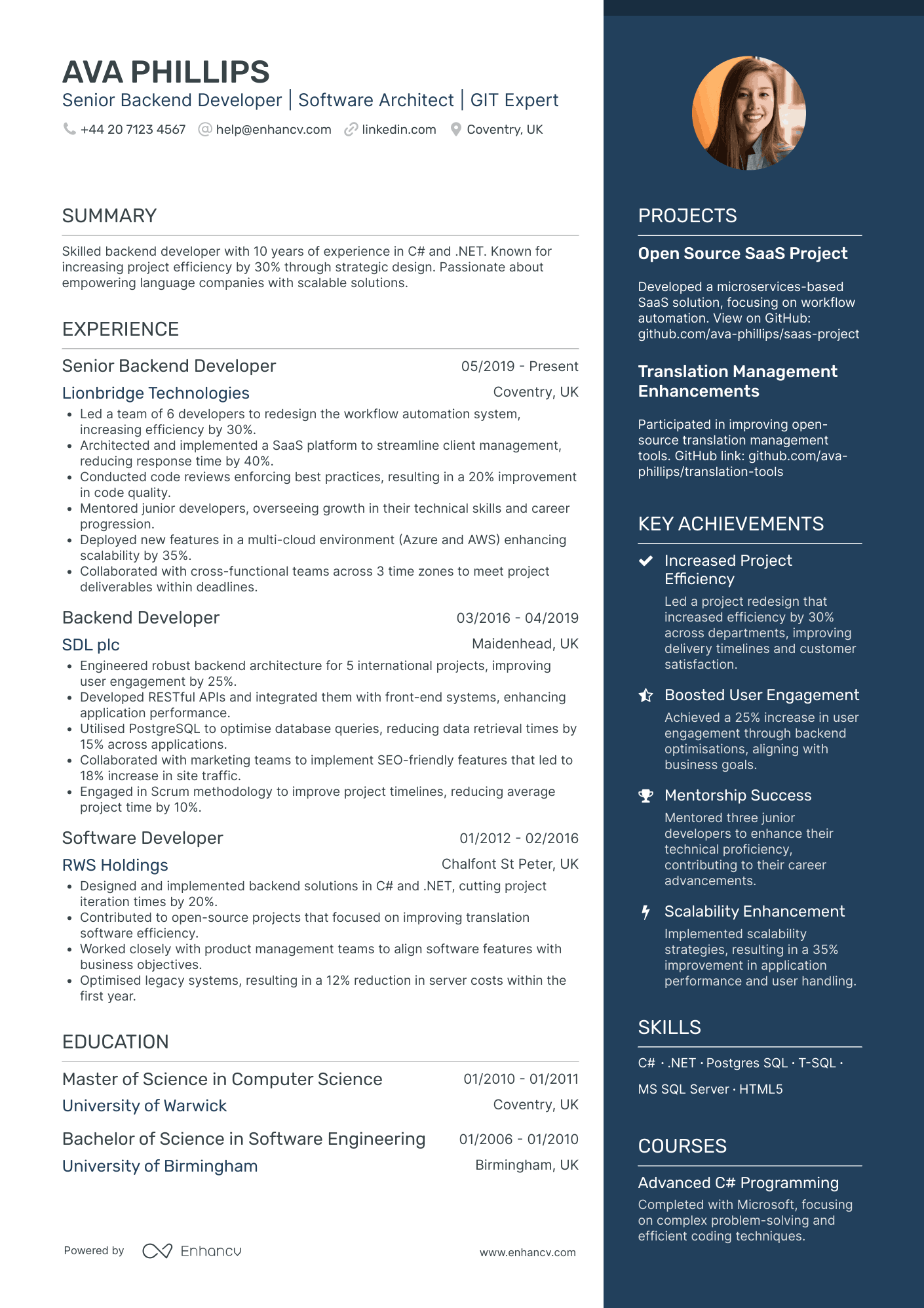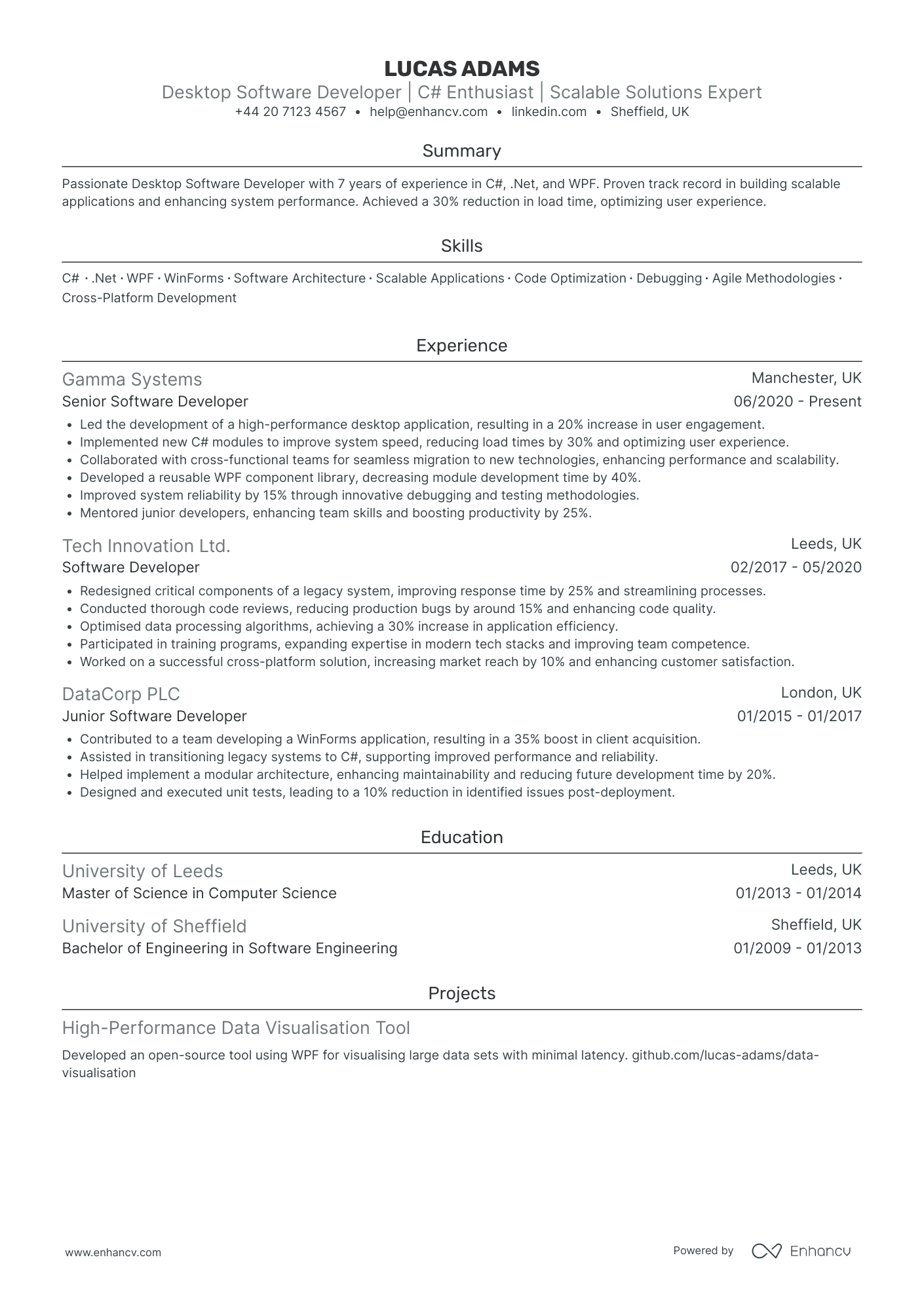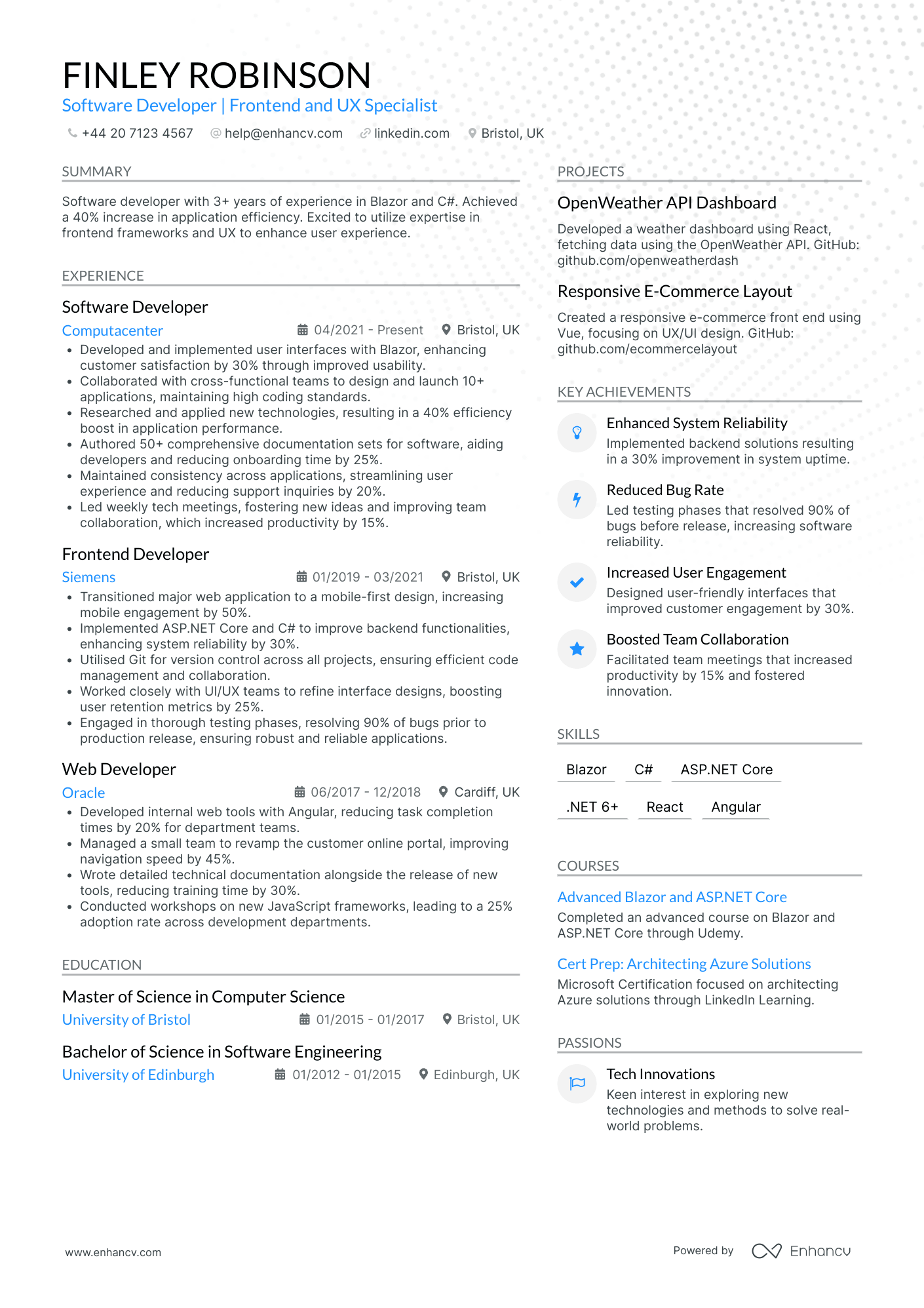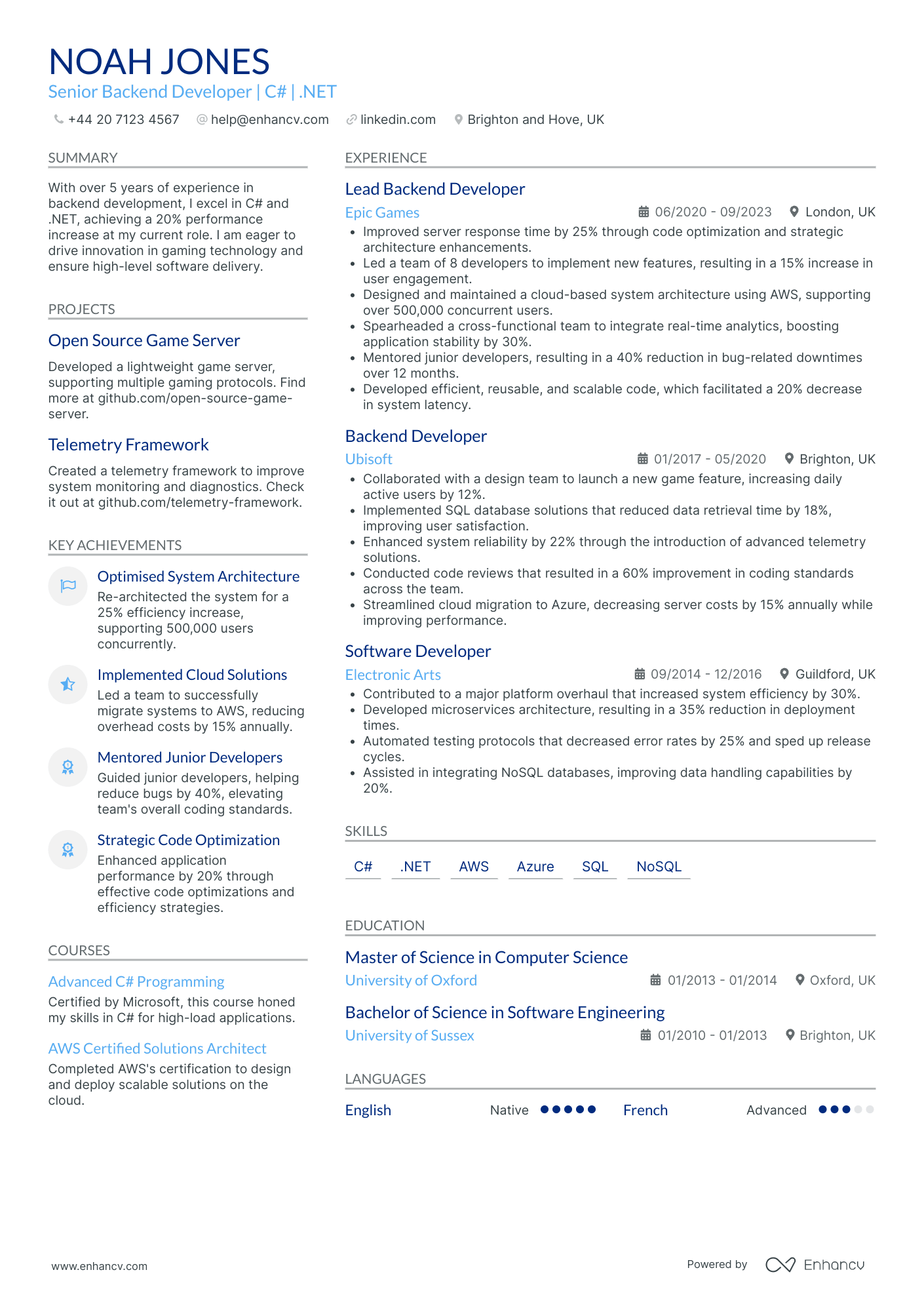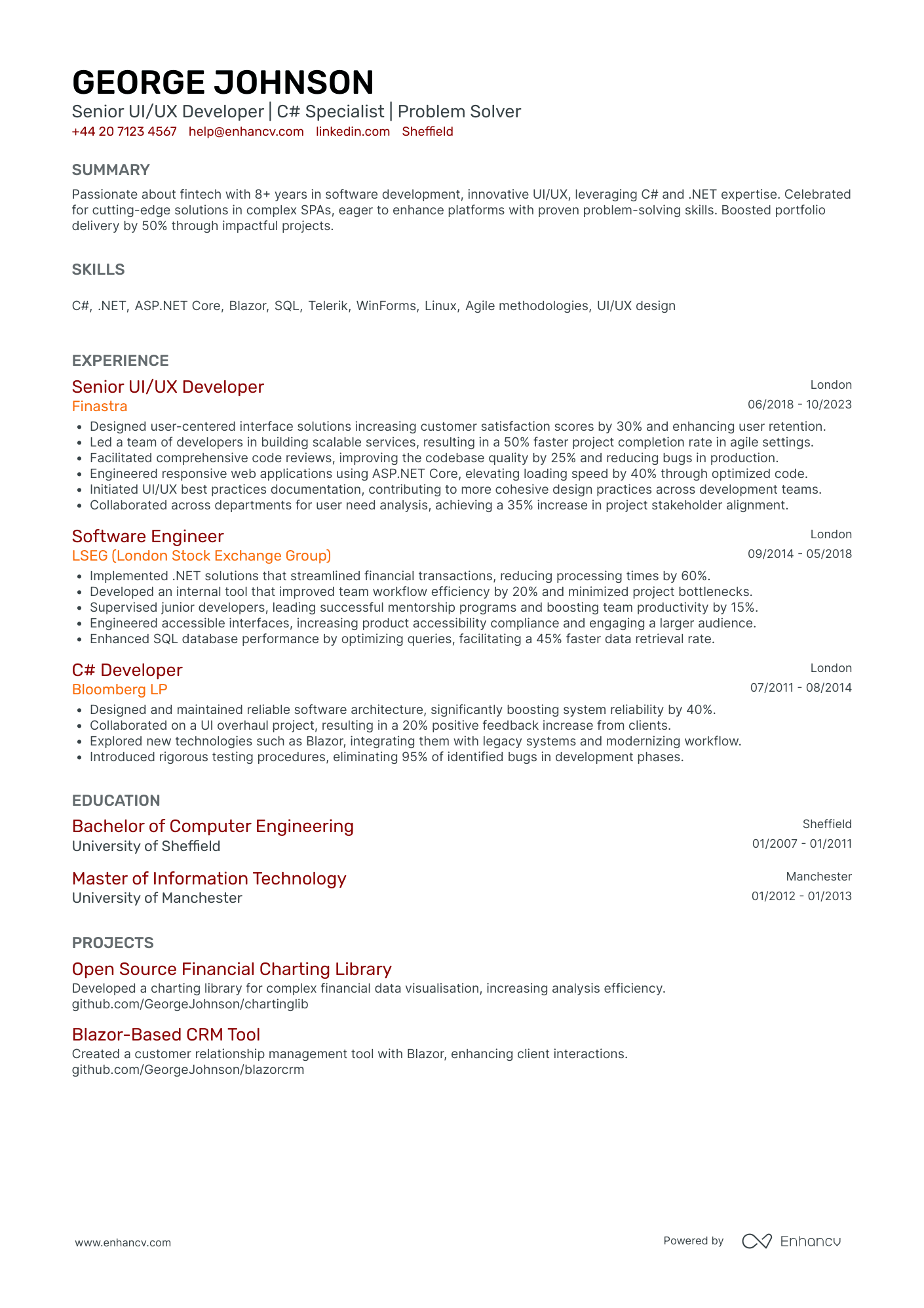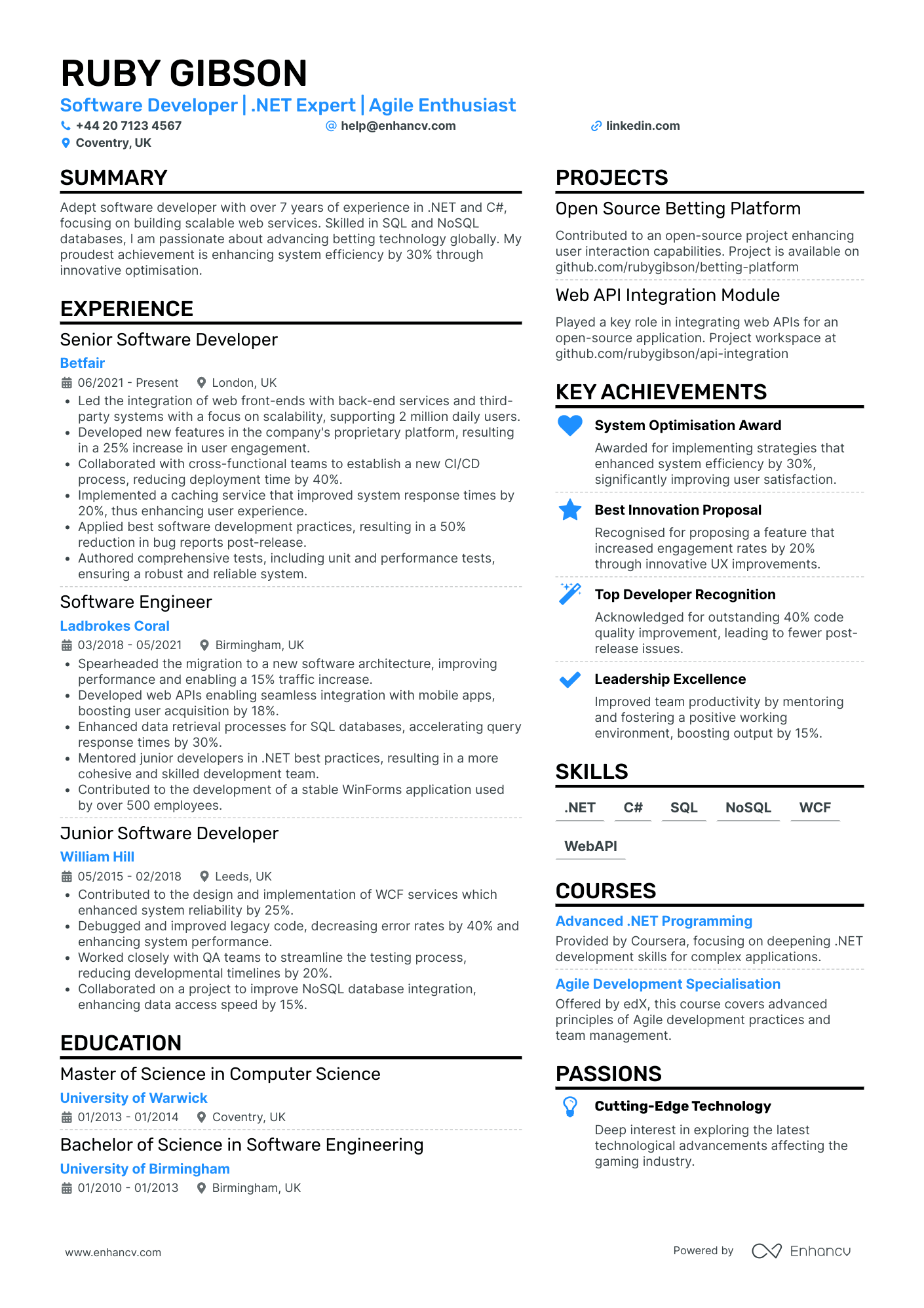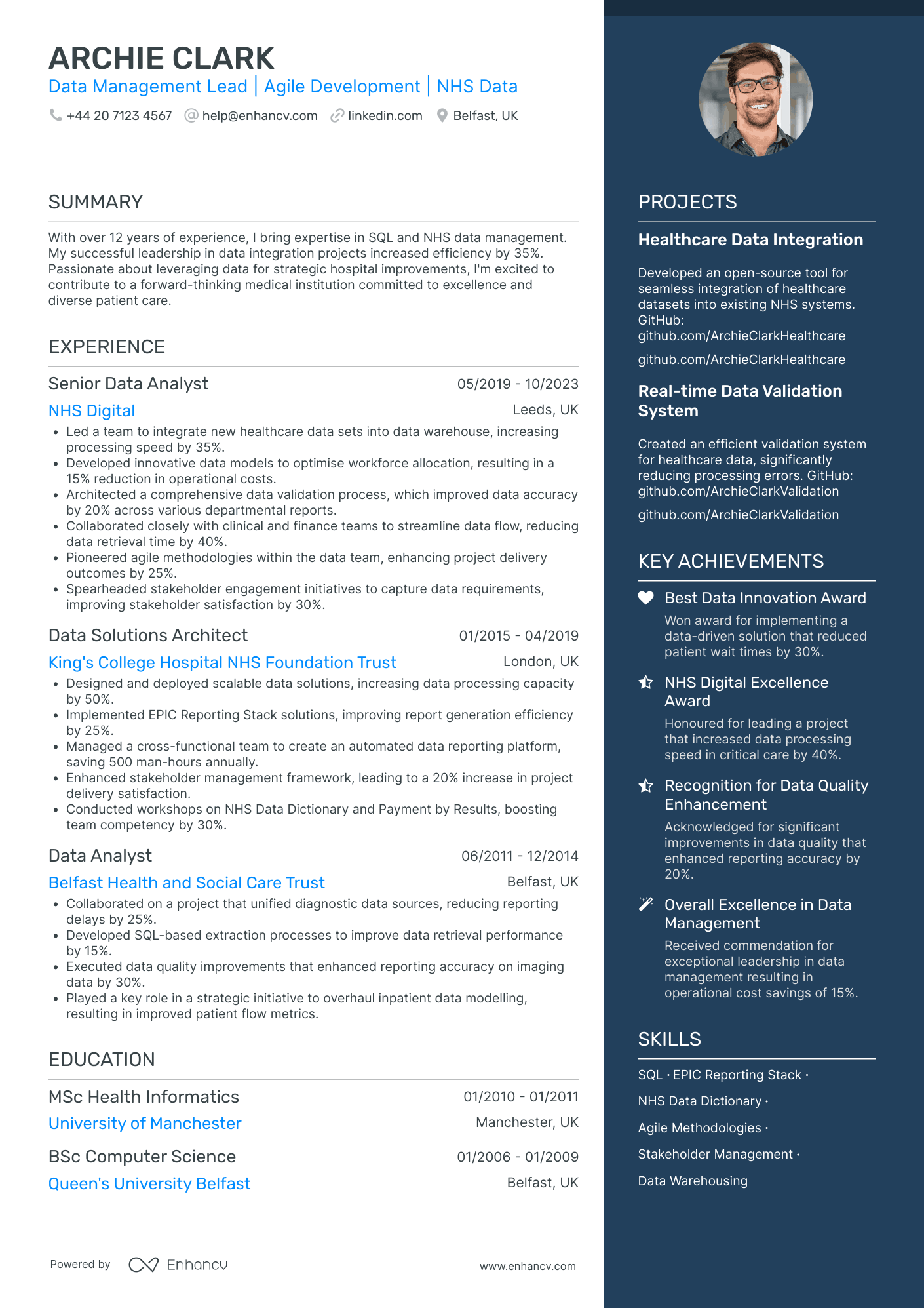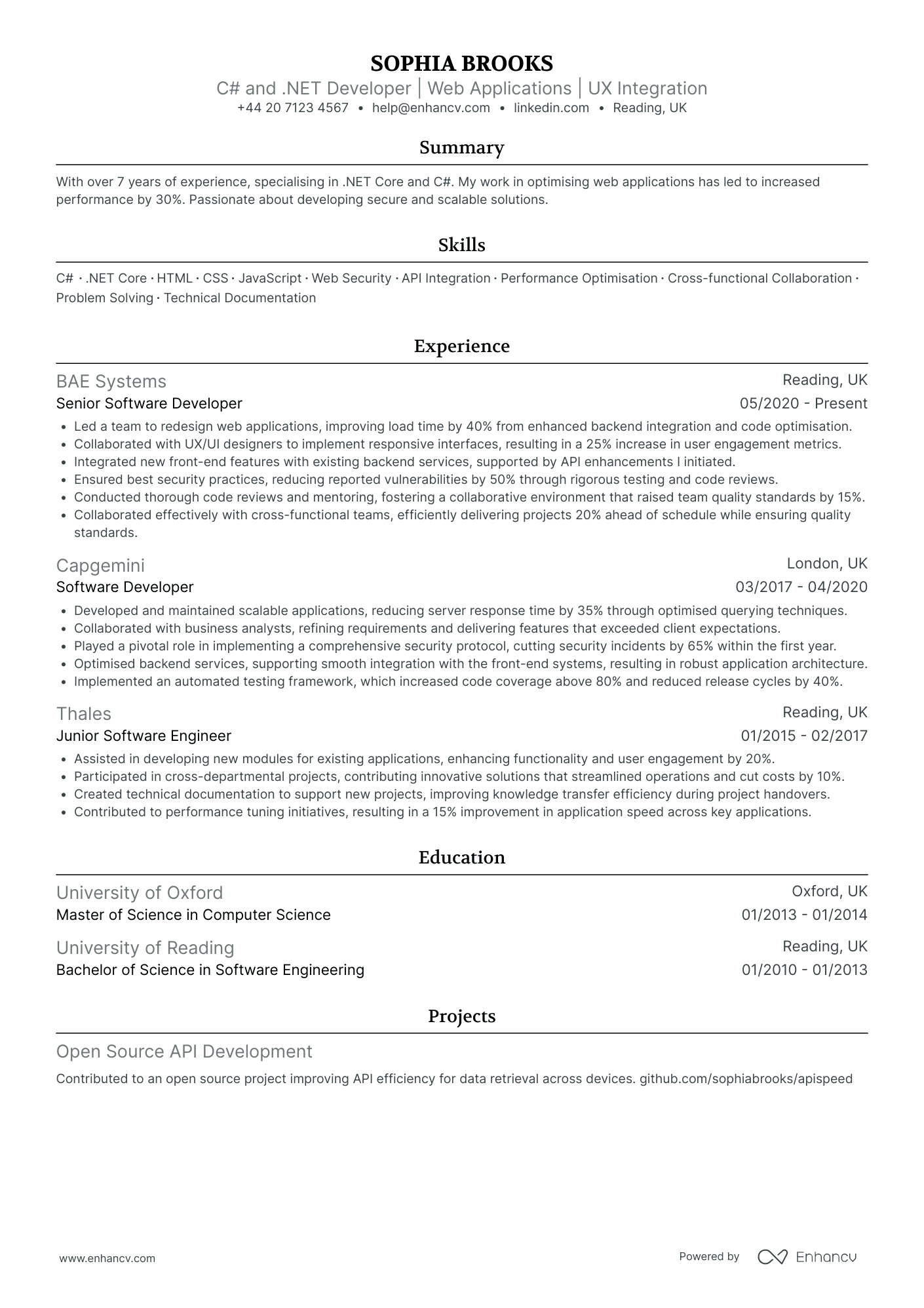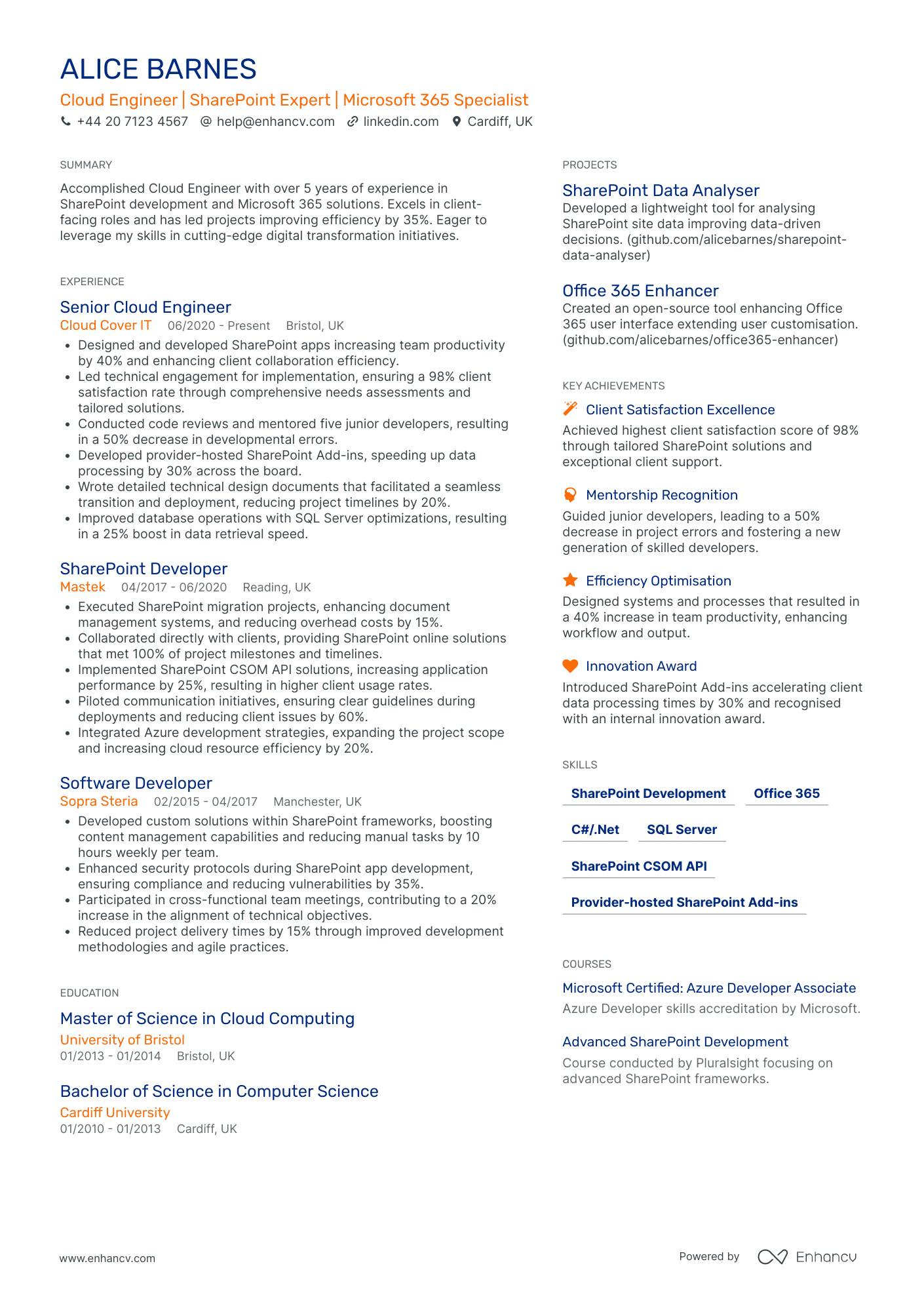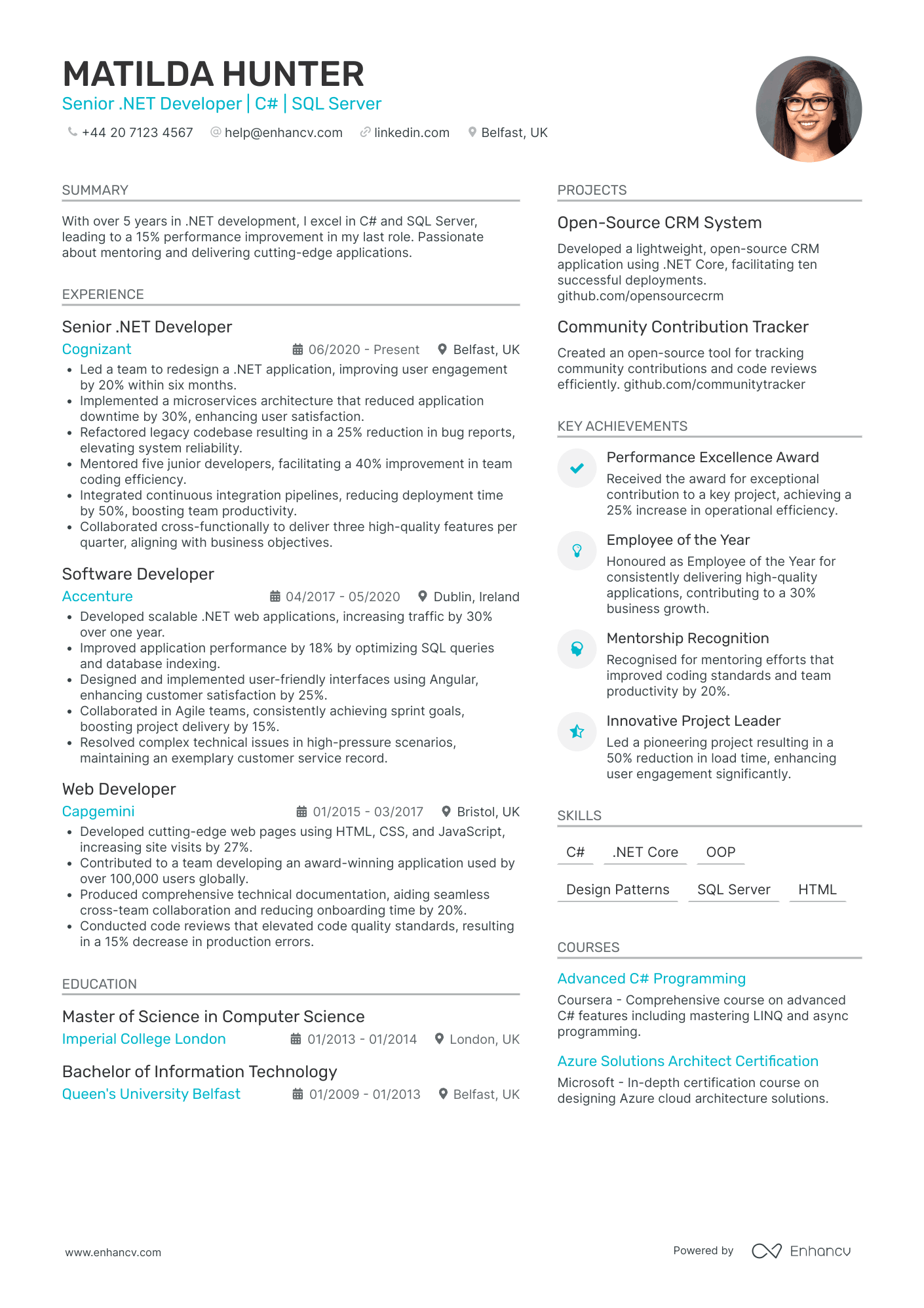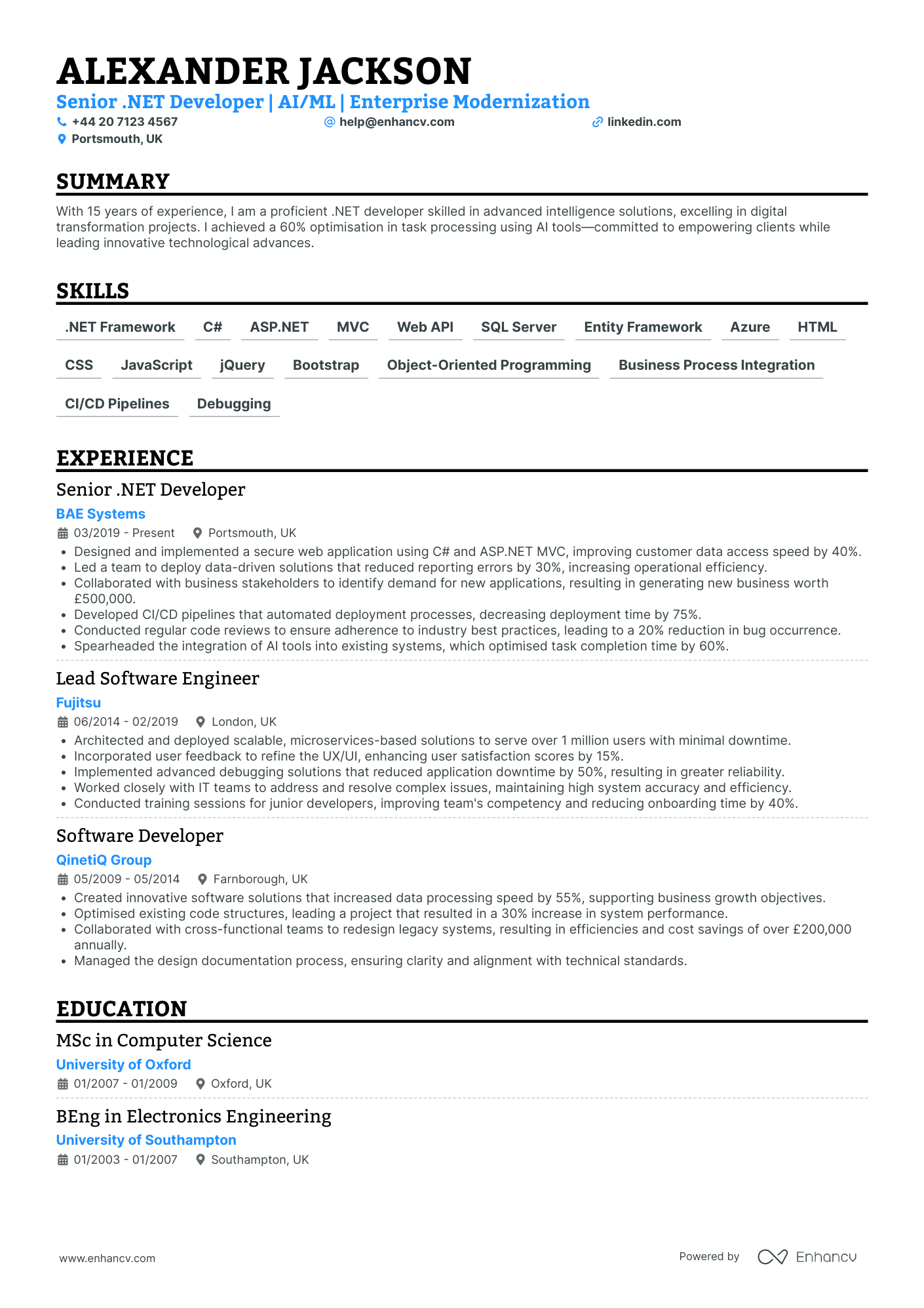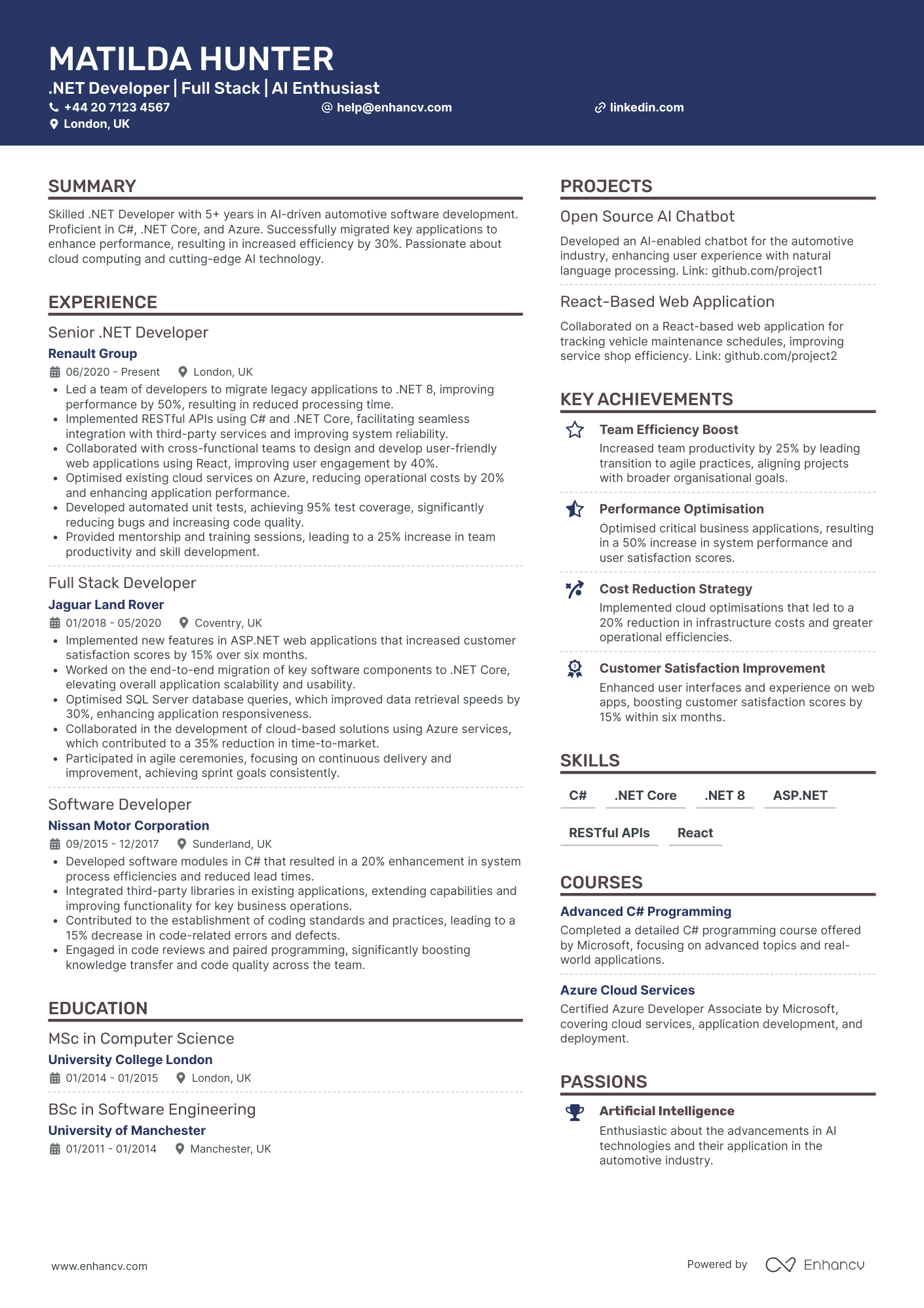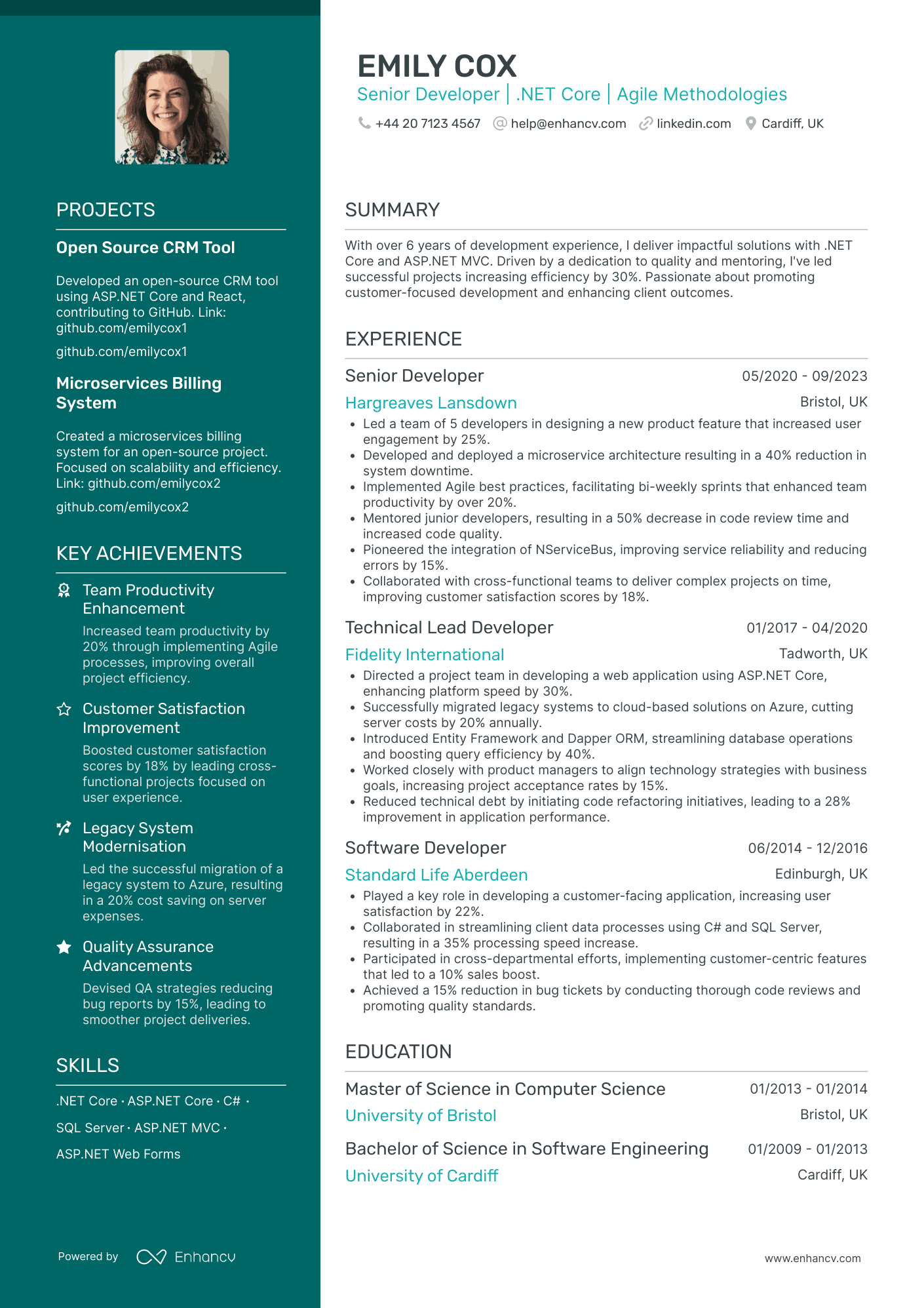One challenge you might face as a .net developer is keeping your CV updated with the latest frameworks and technologies in the ever-evolving .NET ecosystem. Our guide offers insights and tips on how to continuously reflect your growing expertise, ensuring your CV remains at the forefront of industry standards.
- Design and format your professional .net developer CV;
- Curate your key contact information, skills, and achievements throughout your CV sections;
- Ensure your profile stays competitive by studying other industry-leading .net developer CVs;
- Create a great CV even if you happen to have less professional experience, or switching fields.
When writing your .net developer CV, you may need plenty of insights from hiring managers. We have prepared industry-leading advice in the form of our relevant CV guides.
CV examples for .net developer
By Experience
Senior .Net Developer
- Impactful career trajectory - Emily's career trajectory demonstrates significant growth, with her advancing from a Software Developer at Barclays to a Senior Software Developer at HSBC. Her roles have consistently focused on improving invoicing systems and cloud integration, showcasing a clear progression in responsibility and expertise within the financial services sector.
- Proficiency in contemporary tools and technologies - The CV highlights Emily's command over tools and technologies pivotal to her industry, including C#, AWS services, Docker, and Kubernetes. Her capability to leverage these technologies for cloud solutions and application efficiency speaks to her technical acumen and relevance in the modern financial technology landscape.
- Significant business impact and leadership - Emily's achievements illustrate her ability to drive substantial business impacts, such as leading initiatives that reduced deployment times by 50% and enhancing operational efficiencies considerably. Additionally, her role in mentoring has directly contributed to a 20% improvement in team performance, signaling strong leadership and interpersonal skills.
Junior .Net Developer
- Clear and Structured Presentation - The CV is well-organized, with distinct sections like experience, education, skills, and achievements, each clearly outlined. This systematic presentation allows for easy navigation and ensures the reader can quickly locate relevant information, making the content both concise and accessible.
- Strong Technical Expertise and Achievements - Alice Barnes demonstrates a robust technical skill set with proficiency in .NET, C#, and SQL, crucial for her role as a software engineer. Her achievements, such as increasing data processing efficiency by 30% and leading a team to develop a CRM application, highlight her impact on business results and her technical acumen.
- Cross-Functional and Leadership Abilities - The CV exhibits Alice's capability to collaborate across different functions, evidenced by her role in leading a team of five and contributing to a multidisciplinary group. Moreover, her leadership in developing a new API service shows she can spearhead projects and drive integration improvements.
Lead .Net Developer
- Content Presentation and Clarity - The CV is exceptionally well-structured, starting with a concise personal summary that introduces Max Wright's key strengths and areas of expertise. Each section is clearly labeled and succinctly written, allowing for easy navigation and quick identification of relevant information, which is ideal for potential employers looking to quickly gauge his suitability for a role.
- Career Progression and Growth - Max Wright's career trajectory from Software Developer to his current role as a .NET Developer demonstrates a steady progression through increasingly responsible positions. His move to lead API design and management, alongside mentoring roles, indicates strong leadership potential and a commitment to career advancement within the industry.
- Technical Prowess and Industry Depth - This CV effectively highlights Max's comprehensive technical skills, particularly in .NET framework, C#, Angular, and cloud technologies like Azure. His accomplishment of a 30% performance improvement on a major project showcases his technical problem-solving capabilities and ability to deliver impactful results, which are critical for any software development role.
Principal .Net Developer
- Comprehensive Structure and Clarity - The CV is structured in a clear and logical manner, starting with essential contact information and progressing through a well-organized presentation of work experience, education, skills, and additional achievements. This layout allows potential employers to quickly ascertain the candidate's suitability for the role.
- Progressive Career Development - Emily's career trajectory is impressive, showcasing a steady progression from Software Developer to Senior Developer, and then to Technical Lead Developer. This advancement not only signifies her growing expertise but also reflects her ability to take on increased responsibilities and leadership roles within prominent companies.
- Advanced Technical Expertise - The CV emphasizes depth in industry-specific tools and methodologies, such as .NET Core, ASP.NET MVC, and Agile practices, which are critical in the software development space. Emily’s proficiency in using Azure for cloud solutions further highlights her technical adaptability to modern technological trends, setting her apart in the field.
By Role
.Net Web Developer
- Structured and Focused Presentation - The CV excellently structures content by clearly delineating each section, utilizing concise bullet points to present key achievements and responsibilities. This approach enhances readability and enables quick identification of core competencies and accomplishments, making the document a compelling portrayal of the candidate's capabilities.
- Continuous Career Advancement - Harry Williams demonstrates a clear upward trajectory in his career, showing a shift from foundational software development roles to specialized positions as a .NET Web Developer. Each role reflects increased responsibility and leadership, illustrating a progression towards more complex projects and strategic involvement in technology-driven solutions.
- Incorporation of Cutting-edge Tools - The CV highlights the candidate's expertise with contemporary tools such as .NET Core, Vue.js, and Docker, demonstrating a robust understanding of industry-specific technologies. This proficiency in modern development environments underscores their technical depth and ability to implement effective and innovative solutions.
.Net Application Developer
- Structured overview of career progression - The CV outlines Isla King's advancement from Software Developer to Senior Full Stack Developer, showcasing significant growth within the industry. Transitioning through prominent companies like Sky UK, Barclays, and BT Group, it illustrates a clear career trajectory marked by increased responsibilities and complex project involvement.
- Integration of advanced technologies and methodologies - This CV is rich with industry-specific elements, highlighting Isla's proficiency with Angular, .NET, and Azure Cloud Services. It captures a deep technical acumen through detailed achievements such as designing RESTful services and implementing CI/CD pipelines, which are key in modern application development.
- Emphasis on leadership and collaboration - Throughout the CV, there are multiple mentions of leadership qualities, such as spearheading development teams and mentoring junior developers. These experiences demonstrate Isla King's strong capability in team leadership and collaboration, enhancing team productivity and cohesion, further underlined by considerable improvements in coding standards and deployment efficiencies.
.Net Software Developer
- Consistent career progression - The CV highlights a clear and upward career trajectory, showcasing Thomas Walker's growth from a Software Engineer to a Senior C# Developer within prestigious organizations. This progression denotes adaptability and the acquisition of increasingly complex responsibilities, demonstrating his commitment and competence in advancing within the industry.
- Emphasis on technical expertise and tools - The use of advanced tools and methodologies such as LINQ, Entity Framework, RabbitMQ, and CQRS indicates a deep technical knowledge essential for complex software development tasks. This depth of skill highlights Thomas's capacity to leverage industry-standard technologies to enhance performance and delivery in significant projects.
- Cross-functional collaboration and leadership - The CV consistently presents instances of Thomas leading cross-departmental collaboration using Agile methodologies. His ability to coordinate effectively with diverse teams while reducing delivery times by 25% illustrates his adeptness in leadership, communication, and fostering a cooperative work environment.
.Net Full Stack Developer
- Clear Structure and Readable Content - The CV stands out by utilizing a structured layout with clearly defined sections, making it easy for employers to navigate through Harper Webb's credentials. Each section from experience to education is concise, ensuring that the pertinent details are readily accessible and digestible.
- Consistency in Career Progression - Harper's career trajectory is marked by consistent growth, transitioning from roles like Software Developer at BT Group to a Lead Full Stack Developer at Computacenter. This upward mobility illustrates not just an accumulation of experience but also enhanced responsibilities and leadership capabilities over an impressive time span.
- Depth in Technical Proficiency - The CV reflects Harper's deep industry knowledge through tools and methodologies like React, TypeScript, .NET Core, and Azure. The emphasis on microservices architecture and modern cloud integration demonstrates significant technical depth and specialization that align perfectly with the expectations for a Senior Full Stack Developer.
.Net Backend Developer
- Comprehensive Skills Portfolio - The CV stands out due to its detailed presentation of the candidate's technical skills, which include a blend of programming languages (C#, .NET) and database technologies (Postgres SQL, MS SQL Server). This extensive skill set showcases her ability to tackle complex backend development challenges while ensuring robust and scalable solutions.
- Proven Leadership and Mentorship - Ava's career trajectory reveals a clear progression from software developer to senior backend developer, where she has demonstrated strong leadership by managing a team of six developers. Her commitment to mentoring junior developers further highlights her soft skills, fostering a culture of growth and continuous improvement.
- Impactful Achievements with Business Relevance - The achievements section effectively communicates the business impact of Ava's work. By detailing accomplishments such as a 30% project efficiency increase and a 40% reduction in client management response time, the CV underscores her ability to drive strategic improvements that align with organizational objectives and customer satisfaction.
.Net Desktop Developer
- Exceptional Career Progression - Lucas Adams’ career trajectory showcases a consistent upward movement, starting as a Junior Software Developer and advancing to a Senior Software Developer role. Each position throughout his career path illustrates progressive responsibility and growth, reflecting his capability to adapt and excel in increasingly complex roles.
- Technical Depth and Tool Mastery - The CV highlights Lucas' proficiency with industry-specific tools and technologies like C#, .Net, and WPF. His experience in developing a reusable WPF component library and optimizing system performance demonstrates deep technical knowledge and the ability to leverage tools for creating scalable and efficient software solutions.
- Leadership and Mentorship - Lucas has not only developed technical skills but also showcased soft skills by mentoring junior developers. This commitment to team development underscores his leadership qualities and his ability to foster a collaborative and productive work environment, enhancing overall team innovation and efficiency.
.Net Mobile Developer
- Structured Presentation for Clarity - The CV is well-organized, providing a clear hierarchy of information that guides the reader through the candidate’s qualifications. Each section is distinct and succinct, ensuring key details about the candidate's skills and achievements are easily accessible, which is crucial for quick assessments by hiring managers.
- Diverse Industry Experience and Growth - Finley Robinson has demonstrated significant career progression through different roles and companies, gaining valuable experience at industry leaders like Siemens, Oracle, and Computacenter. This trajectory underscores a journey marked by increased responsibility and expertise in both frontend development and the broader field of software engineering.
- Technical Proficiency and Industry-Specific Expertise - The CV highlights specific technical proficiencies such as Blazor, C#, ASP.NET Core, and Angular, underscoring Finley's ability to leverage advanced tools and methodologies that are essential in the modern software development landscape. This depth of knowledge is complemented by a focus on user experience and frontend frameworks, aligning well with the candidate's specialization in UX.
.Net Game Developer
- Structured and Comprehensive Presentation - The CV is exceptionally well-organized, featuring clear sections such as experience, education, skills, and projects. This structure ensures that information is easy to find, allowing potential employers to quickly identify the candidate's qualifications and competencies relevant to the role of a Senior Backend Developer.
- Rapid Career Growth and Leadership Development - Noah Jones’s career trajectory is impressive, showcasing significant growth from a Software Developer to a Lead Backend Developer over the course of nine years. This progression highlights his ability to take on increased responsibilities, lead teams, and effectively guide projects, all crucial aspects of senior roles.
- Technological Expertise and Strategic Vision - The CV reflects deep industry-specific knowledge by focusing on tools and methodologies such as C#, .NET, AWS, and microservices architecture. Jones’s technical depth is complemented by strategic achievements like optimizing system performance and implementing cost-saving cloud solutions, demonstrating a balance of hard skills and business acumen.
By Industry
.Net Developer in Financial Services
- Structured Clarity and Conciseness - The CV is organized effectively with clear headings and sections, making it easy to navigate and understand the candidate's qualifications. Each section is concise yet comprehensive, providing just enough detail to convey expertise without overwhelming the reader.
- Career Growth in Fintech Sector - George Johnson's career trajectory shows a progressive growth in the fintech industry, reflecting his increasing responsibilities and specialization. Starting as a C# Developer at Bloomberg LP, he moved through roles demonstrating advanced skills, culminating as a Senior UI/UX Developer at Finastra.
- Industry-Specific Tools and Technical Depth - The CV stands out for its industry-specific tools and methodologies such as C#, .NET, Blazor, and ASP.NET Core. This technical depth showcases George's expertise and relevance in developing innovative financial technology solutions.
.Net Developer in Healthcare
- Logical and Structured Content Presentation - The CV is exceptionally well-organized, allowing for easy navigation through the various sections. Each section is clearly defined with concise yet descriptive bullet points, ensuring that key achievements and technical proficiencies are communicated effectively without overwhelming detail.
- Clear Career Progression and Specialization - Ruby's career trajectory is a testament to her growth within the software development realm; from a junior developer to a senior position at Betfair, it demonstrates her increasing responsibilities and skills. The trajectory also highlights her niche expertise in the betting industry, showcasing consistent development in .NET technologies and agile methodologies.
- Deep Technical Competence in Industry-relevant Tools - The CV emphasizes Ruby's mastery of specific technologies such as .NET, C#, and SQL, crucial for her role in developing scalable web services and web APIs. It also demonstrates her agility in utilizing CI/CD processes and integration capabilities, underscoring her ability to deliver high-performance platforms.
.Net Developer in Education
- Structured Presentation with Impact - The CV follows a clear and organized structure, presenting each section concisely yet comprehensively. Each section is filled with detailed bullet points that succinctly communicate key achievements and responsibilities, making it easy for the reader to grasp the candidate's capabilities quickly.
- Demonstrates Progressive Career Growth - Archie's career trajectory showcases a clear path of growth from a Data Analyst role to a Senior Data Analyst and eventually to leading data management projects. This progression highlights both vertical promotion and an increasing level of responsibility, reflecting the candidate's ability to adapt and excel in diverse settings within the healthcare industry.
- Mastery of Industry-Specific Tools and Methodologies - The CV highlights Archie's proficiency in specialized tools and methodologies pertinent to healthcare data management, such as the EPIC Reporting Stack, NHS Data Dictionary, and agile methodologies. This technical depth indicates not only familiarity but expertise that is crucial in navigating the complex landscape of NHS data systems.
.Net Developer in Retail
- Comprehensive presentation of professional experience - The CV is presented with a logical structure that makes it easy to follow, showcasing a well-organized career timeline. Each position held is clearly delineated, with bullet points that succinctly convey key achievements and responsibilities. This clarity aids in quickly understanding the candidate's career progress and impact at each role.
- Clear upward career trajectory - Sophia Brooks has displayed a solid career growth from a Junior Software Engineer to a Senior Software Developer. This progression within reputable firms such as BAE Systems and Capgemini highlights both her rising responsibilities and the trust placed in her. This upward movement in roles reflects her ability to not only adapt but excel in increasing capacities.
- Demonstrates depth in .NET and C# technologies - The CV highlights specialized knowledge in .NET Core and C#, making clear the candidate's proficiency in these critical industry tools. Specific projects, such as redesigns and API integrations, emphasize a deep understanding of developing robust software solutions and optimizing application performance.
.Net Developer in Manufacturing
- Simplified Structure and Clarity - The CV is structured logically with distinct sections such as experience, education, skills, and achievements. Each section is succinct and uses bullet points for easy readability, ensuring that even detailed technical information is accessible and comprehensible. The presentation aids in conveying the candidate's qualifications without overwhelming the reader with unnecessary information.
- Strong Career Trajectory - Alice Barnes demonstrates a clear career progression from a Software Developer to a Senior Cloud Engineer, showcasing growth and advancement within her field. Her transition from development roles to a senior engineering position implies successful adaptation and a growing scope of responsibilities, reflecting her commitment to professional development and leadership.
- Technical Depth in SharePoint and Cloud Technologies - The CV highlights unique expertise in SharePoint development and Microsoft 365, coupled with advanced understanding of cloud technologies. Her proficiency in tools such as SQL Server and Azure, along with her development of SharePoint Add-ins and applications, indicates a deep-rooted technical acumen that is crucial for a Cloud Engineer.
.Net Developer in Logistics
- Impressive Career Growth - The candidate demonstrates a clear upward trajectory in their career, progressing from a Web Developer role at Capgemini to a Senior .NET Developer position at Cognizant. This progression highlights her ability to rapidly develop and refine her skills, adapting to more complex and leadership-oriented roles over time.
- Strong Leadership and Mentoring Skills - Matilda's experience includes mentoring five junior developers and leading a team to redesign a .NET application, which underscores her leadership capabilities and commitment to fostering a collaborative environment. Her efforts enhanced team productivity and coding efficiency, which are critical aspects of management roles in tech.
- Technical Expertise with Modern Approaches - The CV reflects the candidate's deep technical knowledge and understanding of modern development methodologies. Her proficiency in technologies such as .NET Core, Azure DevOps, and microservices architecture, combined with experience in implementing continuous integration pipelines, positions her well for developing scalable, robust enterprise solutions.
.Net Developer in Telecommunications
- Strategic career growth and leadership trajectory - Alexander Jackson's career path demonstrates steady growth, evolving from a Software Developer at QinetiQ Group to a Senior .NET Developer at BAE Systems. This progression highlights his leadership abilities and increasingly strategic roles, showcasing adaptability and readiness to take on more complex challenges over time.
- Diverse skill set tailored to industry demands - The CV illustrates an impressive arsenal of technical skills including .NET Framework, C#, ASP.NET, and Azure, coupled with advanced methodologies like CI/CD pipelines and microservices architecture. Such skills are crucial to supporting enterprise modernization efforts and aligning with current industry trends.
- High-impact achievements with clear business benefits - Each professional experience is accentuated by quantifiable achievements, such as a 60% optimization in task completion with AI tools and accomplishing £500,000 in new business. These accomplishments emphasize not just technical proficiency but the tangible value added to the organizations he has been part of, underlying his contribution to their financial and operational success.
.Net Developer in Automotive
- Structured Presentation of Information - The CV is well-organized, featuring distinct sections for experience, education, skills, projects, and achievements. Each section is clear and concise, allowing hiring managers to quickly identify key information relevant to the role of a .NET Developer. The layout facilitates easy navigation without overwhelming the reader, making it appealing and functional.
- Steady Career Progression in a Specialized Domain - Matilda demonstrates a clear career trajectory with progressive roles from Software Developer to Senior .NET Developer across major automotive companies. This growth not only shows a deepening of her expertise in the domain but also highlights her ability to take on increased responsibilities and complex projects effectively.
- Industry-Specific Technical Proficiency - The CV showcases Matilda's technical depth in using tools such as .NET Core, Azure, and RESTful APIs, essential for cutting-edge AI-driven automotive software solutions. Her project experiences and education further reinforce her expertise and eagerness to stay current with technological advancements in her field.
Structuring your .net developer CV layout: four factors to keep in mind
There are plenty of best practices out there for your CV layout and design. At the end of the day, a clear format and concise CV message should be your top priority. Use your CV design to enhance separate sections, bringing them to the forefront of recruiters' attention. At the same time, you can write content that:
- Follows the reverse chronological order in the experience section by first listing your most recent jobs;
- Incorporates your contact information in the header, but do skip out on the CV photo for roles in the UK;
- Is spotlighted in the most important sections of your CV, e.g. the summary or objective, experience, education, etc. to show just how you meet the job requirements;
- Is no longer than two-pages. Often, the one-page format can be optimal for your .net developer CV.
Before submitting your CV, you may wonder whether to export it in Doc or PDF. With the PDF format, your information and layout stay intact. This is quite useful when your CV is assessed by the Applicant Tracker System (or the ATS) . The ATS is a software that scans your profile for all relevant information and can easily understand latest study on the ATS , which looks at your CV columns, design, and so much more.
PRO TIP
Use bold or italics sparingly to draw attention to key points, such as job titles, company names, or significant achievements. Overusing these formatting options can dilute their impact.
The top sections on a .net developer CV
- Core Competencies stresses your main technical skills.
- Relevant Experience showcases your work history.
- Education and Certifications highlight qualifications.
- Technical Projects display your practical abilities.
- Professional Development illustrates ongoing learning.
What recruiters value on your CV:
- Highlight your expertise in .NET-specific technologies, such as ASP.NET, Entity Framework, and .NET Core, by detailing projects where you've successfully implemented these frameworks.
- Showcase your fluency in C# and VB.NET, including any advanced language features you've utilised, such as LINQ or asynchronous programming paradigms.
- Emphasise any experience with cloud services, especially Microsoft Azure, as modern .NET applications are often integrated with cloud computing environments.
- Document your understanding of software design patterns and principles, such as MVC, MVVM, or Dependency Injection, which are crucial for high-quality .NET development.
- Include contributions to open-source projects or community involvement, such as writing .NET blogs or speaking at meetups, to demonstrate your passion and commitment to the .NET ecosystem.
Recommended reads:
Our checklist for the must-have information in your .net developer CV header
Right at the very top of your .net developer CV is where you'd find the header section or the space for your contact details, headline, and professional photo. Wondering how to present your the name of the city you live in and the country abbreviation as your address;
- are tailored to the role you're applying for by integrating key job skills and requirements;
- showcase what your unique value is, most often in the form of your most noteworthy accomplishment;
- select your relevant qualifications, skills, or current role to pass the Applicant Tracker System (ATS) assessment. Still not sure how to write your CV headline? Our examples below showcase best practices on creating effective headlines:
Examples of good CV headlines for .net developer:
- Senior .NET Developer | Azure Specialist | C# Expert | Agile Advocate | 10+ Years of Experience
- Lead .NET Software Engineer | Full-Stack Developer | REST API Guru | MCPD Certified | 12 Years In-field
- .NET Solutions Architect | Cloud Integration Expert | Microservices Enthusiast | 15 Years Professional Expertise
- Junior .NET Programmer | MVC Novice | Keen Learner of AI & ML | BSc Computer Science Graduate
- Mid-Level ASP.NET Developer | Database Management Savvy | DevOps Practitioner | 5 Years Hands-On Development
- Experienced .NET Consultant | Enterprise Application Innovator | TDD Proponent | Scrum Certified | 8+ Years Experience
Opting between a .net developer CV summary or objective
Within the top one third of your .net developer CV, you have the opportunity to briefly summarise your best achievements or present your professional goals and dreams. Those two functions are met by either the CV summary or the objective.
- The summary is three-to-five sentences long and should narrate your best successes, while answering key requirements for the role. Select up to three skills which you can feature in your summary. Always aim to present what the actual outcomes were of using your particular skill set. The summary is an excellent choice for more experienced professionals.
- The objective is more focused on showcasing your unique value as a candidate and defining your dreams and ambitions. Think about highlighting how this current opportunity would answer your career vision. Also, about how you could help your potential employers grow. The objective matches the needs of less experienced candidates, who need to prove their skill set and, in particular, their soft skills.
Still not sure about how to write your CV opening statement? Use some best industry examples as inspiration:
CV summaries for a .net developer job:
- Seasoned .NET Developer with over 8 years’ experience in designing and implementing robust code for high-volume businesses. Expertise in C#, ASP.NET MVC, and SQL Server highlight a proven track record. Achieved a 30% efficiency boost in a legacy system overhaul at a leading fintech firm.
- Ambitious Software Engineer transitioning into .NET development, bringing 5 years of Python and Java expertise. Eager to apply in-depth knowledge of object-oriented programming and database design to enhance .NET applications. Successfully led a cross-functional team in deploying an enterprise-level SaaS solution.
- Dynamic professional with a decade in technical project management pivoting to .NET development. Strong foundation in client-side technologies such as React and JavaScript, now melded with intensive .NET Bootcamp training. Spearheaded the agile transformation for a multinational corporation, leading to a 40% time-to-market reduction.
- Driven individual with a passion for software development and 3 years of experience in systems administration and PHP. Now fully focused on mastering .NET through comprehensive coursework and personal projects. A standout achievement includes the automation of a deployment process that cut downtime by 50%.
- As a budding developer with a fervent interest in technology, I aim to secure a .NET development role where I can contribute my foundational knowledge in C# and my enthusiasm for problem-solving. My ultimate objective is to develop scalable and impactful software solutions while advancing my skills in a collaborative tech-driven environment.
- Seeking to embark on a career in .NET development, leveraging recent certification in .NET Core and C# programming. Although new to the field, I am committed to honing my technical abilities and am eager to apply my strong analytical skills and hands-on experience from personal coding projects to add value to future software innovations.
Best practices for writing your .net developer CV experience section
If your profile matches the job requirements, the CV experience is the section which recruiters will spend the most time studying. Within your experience bullets, include not merely your career history, but, rather, your skills and outcomes from each individual role. Your best experience section should promote your profile by:
- including specific details and hard numbers as proof of your past success;
- listing your experience in the functional-based or hybrid format (by focusing on the skills), if you happen to have less professional, relevant expertise;
- showcasing your growth by organising your roles, starting with the latest and (hopefully) most senior one;
- staring off each experience bullet with a verb, following up with skills that match the job description, and the outcomes of your responsibility.
Add keywords from the job advert in your experience section, like the professional CV examples:
Best practices for your CV's work experience section
- Developed and maintained scalable web applications using ASP.NET MVC, optimising code for security and performance which led to a 20% increase in user engagement.
- Implemented a continuous integration/continuous deployment (CI/CD) pipeline using Azure DevOps, resulting in a 50% reduction in time-to-market for new features.
- Lead a team of junior developers in the creation of a multi-tiered enterprise application, enforcing best practices and code reviews to ensure high-quality deliverables.
- Designed and integrated RESTful APIs with client-side frameworks such as Angular or React, improving the decoupling of front-end and back-end services.
- Utilised Entity Framework for database operations, alongside code-first migrations to manage schema changes which increased development agility and database consistency.
- Applied Test-Driven Development (TDD) methodologies using xUnit and Moq frameworks, resulting in a robust codebase with reduced regression bugs.
- Engaged in client requirement gathering and project planning meetings, translating complex business needs into technical specifications for application enhancements.
- Specialised in performance tuning of .NET applications using profiling tools like JetBrains dotTrace, successfully identifying and rectifying bottlenecks.
- Championed the adoption of containerization with Docker, streamlining the deployment process and ensuring consistency across development, testing, and production environments.
- Led a team of 5 developers in a complete redesign of an e-commerce platform, improving load times by 35% and increasing customer engagement by 20%.
- Architected and implemented a scalable RESTful API using ASP.NET Core which served as the backbone for a high-volume financial service app, handling over 10,000 transactions daily.
- Collaborated across departments to integrate AI and machine learning capabilities into the company's primary CRM tool, enhancing predictive sales analytics.
- Migrated legacy desktop applications to the web using ASP.NET MVC, resulting in a 25% increase in user satisfaction due to improved accessibility and usability.
- Developed a custom, secure user authentication and authorization module which reduced unauthorized access incidents by 50%.
- Optimized SQL Server database queries and indexes for the company’s main ERP system, cutting down report generation times by over 30%.
- Implemented unit and integration testing for critical .NET components, enhancing software reliability by 40%.
- Contributed to the development of a multi-tenant SaaS application using ASP.NET Framework, successfully onboarding 4 major clients within the first year.
- Participated in bi-weekly sprint planning and performed code reviews to ensure adherence to coding best practices and standards.
- Spearheaded the integration of .NET 5 into existing projects, thereby modernizing the application architecture and facilitating a 15% increase in system performance.
- Collaborated with cross-functional teams to develop a distributed microservices architecture which enhanced system scalability and overall uptime.
- Piloted a DevOps initiative using Azure DevOps that automated CI/CD pipelines, reducing deployment times by over 50% and increasing release frequency.
- Engineered a real-time analytics dashboard using SignalR and ASP.NET MVC, providing immediate business insights and improving strategic decision-making.
- Led a critical data migration project from an old VB6 platform to .NET, ensuring zero downtime and preserving 100% data integrity.
- Developed a custom content management system (CMS) that streamlined content publishing workflows, increasing publishing efficiency by approximately 25%.
- Redesigned an outdated WinForms-based inventory management system to WPF using MVVM pattern, improving system maintainability and user experience.
- Deployed enterprise-level .NET applications using Windows Server and IIS, effectively managing app lifecycles and minimizing service interruptions.
- Initiated and led the adoption of code versioning using Git, enhancing team collaboration and reducing code conflicts drastically.
- Developed and maintained scalable .NET APIs for a cloud-based logistics platform, processing over 5,000 requests per hour and improving system efficiency by 20%.
- Collaborated with front-end developers to create responsive, user-centric web applications with React.js and ASP.NET Core.
- Automated key deployment processes using PowerShell scripts, saving the team over 10 hours per week previously spent on manual configurations.
- Designed and implemented a custom workflow engine using .NET Core, which automated processes across various departments, resulting in a 30% reduction in process handling time.
- Actively engaged in the company-wide transition to a microservices-based architecture, enhancing system modularity and easing future integration efforts.
- Utilized Entity Framework Core for ORM, improving database operation speeds by 25% and reducing boilerplate data access code.
- Prototyped and deployed a mobile responsive web application using ASP.NET MVC, significantly enhancing the user experience for mobile users.
- Developed custom reporting tools with .NET and SQL Server Reporting Services (SSRS) that improved reporting accuracy and reduced generation time by 40%.
- Provided mentorship and technical guidance to junior developers, elevating team skill levels and improving project delivery timelines.
- Implemented a centralized exception handling and logging mechanism using ELMAH and log4net in a large-scale ASP.NET application, significantly improving troubleshooting capabilities.
- Enhanced application security by implementing industry-standard authentication and authorization protocols via OAuth, OpenID Connect, and ASP.NET Identity.
- Performed a key role in optimizing application performance by refactoring code, reducing memory footprint by 20%, and increasing overall application responsiveness.
Swapping your professional experience (when you have none) with skills and more
Never underestimate the importance of relevancе when it comes to your .net developer CV. Even if you don't happen to have much or any standard (full-time contract) professional experience, this doesn't mean you shouldn't apply for the role. Instead of a bespoke CV experience section:
- Showcase more prominently any internships, part-time roles, and volunteer experience that are applicable to the role and have taught you job-crucial skills;
- Feature a strengths or achievements section with your transferrable skills or talents you've obtained thanks to your work or life experience;
- Write an objective statement that clearly outlines your values as a candidate and defines your career ambitions;
- List your education or certificates that match the job profile closer to the top of your CV.
Recommended reads:
PRO TIP
Include examples of how you adapted to new tools, environments, or work cultures, showing your flexibility.
Describing your unique skill set using both hard skills and soft skills
Your .net developer CV provides you with the perfect opportunity to spotlight your talents, and at the same time - to pass any form of assessment. Focusing on your skill set across different CV sections is the way to go, as this would provide you with an opportunity to quantify your achievements and successes. There's one common, very simple mistake, which candidates tend to make at this stage. Short on time, they tend to hurry and mess up the spelling of some of the key technologies, skills, and keywords. Copy and paste the particular skill directly from the job requirement to your CV to pass the Applicant Tracker System (ATS) assessment. Now, your CV skills are divided into:
- Technical or hard skills, describing your comfort level with technologies (software and hardware). List your aptitude by curating your certifications, on the work success in the experience section, and technical projects. Use the dedicated skills section to provide recruiters with up to twelve technologies, that match the job requirements, and you're capable of using.
- People or soft skills provide you with an excellent background to communicate, work within a team, solve problems. Don't just copy-paste that you're a "leader" or excel at "analysis". Instead, provide tangible metrics that define your success inusing the particular skill within the strengths, achievements, summary/ objective sections.
Top skills for your .net developer CV:
C# programming
ASP.NET MVC
Entity Framework
LINQ
SQL Server
JavaScript
HTML/CSS
WPF
Web API
Azure
Problem-solving
Communication
Teamwork
Time management
Adaptability
Analytical thinking
Attention to detail
Continuous learning
Creativity
Project management
PRO TIP
If you have received professional endorsements or recommendations for certain skills, especially on platforms like LinkedIn, mention these to add credibility.
Listing your university education and certificates on your .net developer CV
The best proof of your technical capabilities would be your education and certifications sections. Your education should list all of your relevant university degrees, followed up by their start and completion dates. Make sure to also include the name of the university/-ies you graduated from. If you happen to have less professional experience (or you deem it would be impressive and relevant to your application), spotlight in the education section:
- that you were awarded a "First" degree;
- industry-specific coursework and projects;
- extracurricular clubs, societies, and activities.
When selecting your certificates, first ask yourself how applicable they'd be to the role. Ater your initial assessment, write the certificate and institution name. Don't miss out on including the completion date. In the below panel, we've curated relevant examples of industry-leading certificates.
PRO TIP
Use mini case studies or success stories in your CV to demonstrate how your skills have positively impacted previous roles or projects.
Recommended reads:
Key takeaways
Your successful job application depends on how you well you have aligned your .net developer CV to the job description and portrayed your best skills and traits. Make sure to:
- Select your CV format, so that it ensures your experience is easy to read and understand;
- Include your professional contact details and a link to your portfolio, so that recruiters can easily get in touch with you and preview your work;
- Write a CV summary if you happen to have more relevant professional experience. Meanwhile, use the objective to showcase your career dreams and ambitions;
- In your CV experience section bullets, back up your individual skills and responsibilities with tangible achievements;
- Have a healthy balance between hard and soft skills to answer the job requirements and hint at your unique professional value.
